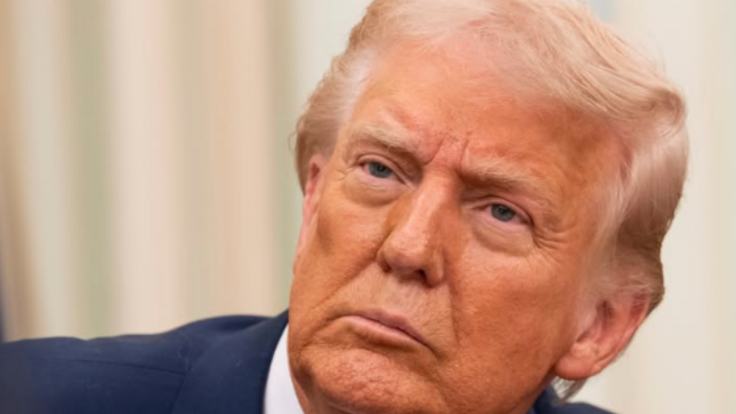Trump Defies Democrats: Orders Pentagon to Tap $8 Billion R&D Budget to Pay Soldiers as Shutdown Drags On

KEY POINTS
- Trump says he will not let Democrats 'hold the military hostage' amid the funding deadlock.
- The move comes as the government shutdown enters its 11th day with no deal in sight.
President Donald Trump has directed the Pentagon to use its research and development (R&D) funds to pay U.S. troops, as the federal government shutdown entered its 11th day with no resolution in sight.
The move, announced on Saturday via Trump's Truth Social account, marks one of the most unconventional responses to a budget standoff in recent history — and one that immediately stirred political debate in Washington.
'I am using my authority, as Commander in Chief, to direct our Secretary of War, Pete Hegseth, to use all available funds to get our Troops PAID on October 15th,' Trump wrote. 'I will not allow the Democrats to hold our Military, and the entire Security of our Nation HOSTAGE with their dangerous Government shutdown.'
The White House has not yet clarified which specific accounts will be affected or how much funding will be redirected. However, a Pentagon official, speaking on condition of anonymity, told Reuters that approximately $8 billion originally earmarked for research, development, testing, and evaluation would be used to cover troop salaries if the shutdown extends beyond October 15.
'The President has directed the Secretary of War to use available funds to pay service members on October 15th. The Department of War has identified approximately $8 billion of unobligated research development testing and evaluation funds (RDTE) from the prior fiscal year that will be used to issue mid month paychecks to service members in the event the funding lapse continues past October 15th,' a Defense Department official has said in a statement .
Funding Crisis Deepens as Shutdown Hits Day 11
The latest impasse stems from a clash between Trump's administration and minority Democrats in Congress over healthcare spending. While Republicans control both the House and Senate, they still require at least seven Democratic votes in the Senate to secure the 60-vote threshold needed to pass a spending bill.
Democrats have refused to support any measure that does not include provisions to continue and expand healthcare subsidies under the Affordable Care Act. Trump, meanwhile, has accused Democratic lawmakers of holding the nation's defence and public safety "hostage" in pursuit of political concessions.
'I am happy to work with the Democrats on their Failed Healthcare Policies, or anything else, but first they must allow our Government to re-open,' Trump added in a post.
Unpaid Federal Workers and Mounting Political Pressure
As the shutdown drags on, hundreds of thousands of federal employees face unpaid furloughs or are working without pay. The administration began implementing widespread layoffs on Friday, following through on Trump's earlier warning that 'non-essential' staff would be affected if Democrats refused to compromise.
The shutdown, now in its second week, has already disrupted multiple government services, from national parks to processing times for federal benefits. Economists warn that the longer it continues, the greater the potential impact on consumer confidence and growth.
On Capitol Hill, frustration is building across party lines. House Democratic Leader Hakeem Jeffries has called minority Democrats back to Washington for a special meeting on Tuesday to 'discuss a path forward in connection with the Republican shutdown and the healthcare crisis they have created.'
House Speaker Mike Johnson, a Trump ally, has said he will not convene any legislative sessions until the shutdown ends — a stance that effectively freezes progress.
A Risky Move With Military Implications
Trump's decision to divert Pentagon funds typically used for long-term research and weapons development has sparked unease among defence analysts and lawmakers. While no law explicitly prevents the president from reallocating certain discretionary military funds during an emergency, critics warn that such measures could compromise future readiness and technological innovation.
'Using R&D funds for payroll is an extraordinary step,' one retired defence official said. 'It keeps soldiers paid in the short term, but it could have ripple effects across critical programs — from missile development to cybersecurity research.'
Still, within Trump's political base, the decision has been lauded as an example of decisive leadership. Conservative commentators praised the President for prioritising the welfare of troops amid partisan gridlock.
Healthcare and Politics at the Heart of the Stalemate
At the core of the dispute lies healthcare — a political flashpoint that has divided Washington for more than a decade. Democrats argue that extending Affordable Care Act subsidies is necessary to protect millions of Americans from rising insurance costs, while Republicans accuse them of holding the government hostage over what they call an 'ideological demand.'
Analysts say the standoff underscores the difficulties of governing in an election-charged climate. With both parties digging in, compromise appears distant. For Trump, who has built his political brand on defying convention, the Pentagon order may be as much a show of strength as it is a fiscal manoeuvre.
'This is Trump at his most characteristic — projecting power, finding a workaround, and making sure his base sees him as the one taking care of America's soldiers,' said political analyst Karen O'Donnell. 'The question is whether this will resolve anything in the long run, or just deepen the stalemate.'
As the shutdown continues, both sides face mounting pressure to act. For now, the President's directive means that troops may still receive their pay cheques — but at a cost that could reverberate far beyond the battlefield.
© Copyright IBTimes 2025. All rights reserved.




















